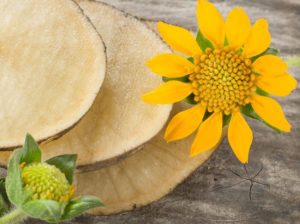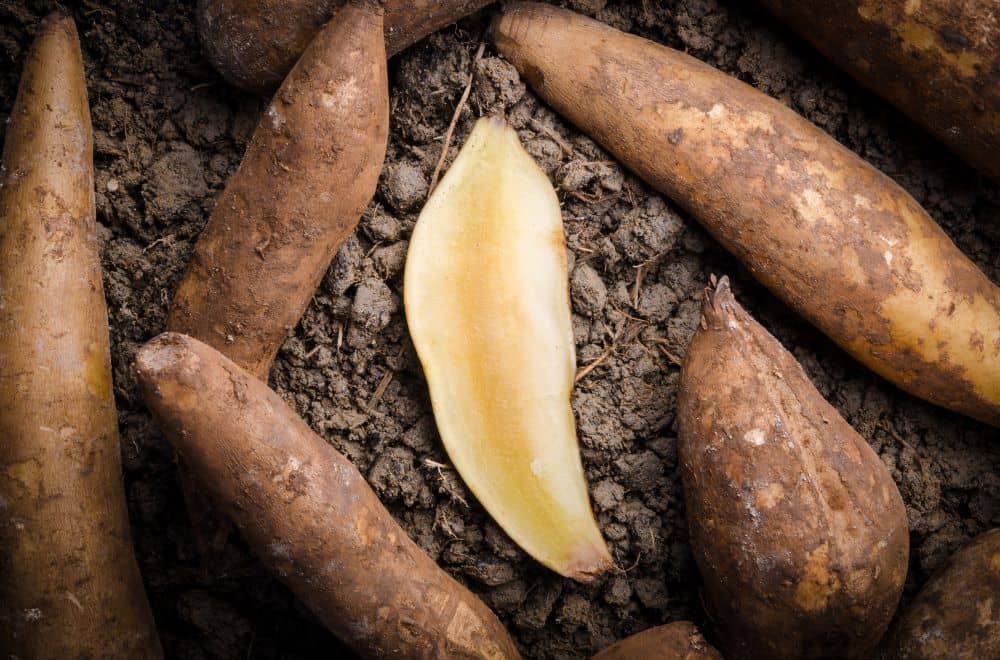In the Garden with Yacon Tubers: The Naturally Sweet, Low Calorie, and Tasty Super Food

If you are looking for a new vegetable to plant this year, may we recommend the taste-tempting yacon tuber? This vegetable has a unique flavour that is delectable whether eaten hot or cold.
The yacon tuber has been growing (pun intended) in Australian popularity for the past decade. While the yacon may be part of the daisy family, it resembles and serves up in the same manner as potatoes, sweet potatoes, and yams. If you haven’t tried this tuber, you are in for a pleasant surprise.
The yacon is a native plant from South America that is traditionally grown in the Andes. The U. K. sales of this nutritional, gut-friendly, tuber began in 2007 and is now a popular plant in Australia, throughout Europe, Japan, and the United States. This vegetable tuber is also commonly known as the ground pear, the pear of the earth, the Bolivian sunroot, and the Peruvian ground apple.
Yacons are easy to grow, take about 24 to 28 weeks for a full growing cycle, and they yield both plumb, brownish tubers and smaller pink tubers called rhizomes. The beauty of yacons is that they can be grown at any time of the year in areas that are frost-free with plenty of sunlight. Three positive benefits for gardeners in the Perth area are that yacons can grow and thrive in poor soil, they are tolerant of drought conditions, and to date are pest-free.
The larger brown tubers are excellent for both eating and drinking pleasure and can be stored for year-round dining enjoyment. In its natural form, the yacon adds a crunchy, pleasing taste to vegetable and fruit salads. You can prevent the vegetable from browning by sprinkling it with lemon juice.
As a vegetable high in inulin, a natural form of fructose, you can use yacon as a flavorful, low-calorie substitute for kale or other greens in healthy juices. Their antidiabetic and hypoglycemic effects are good news for type II diabetics. The yacon is also a prebiotic vegetable that supports both the immune system and gut health. With all the positive benefits contained in one easily grown vegetable, what is not to love about the yacon?
You can use a yacon in the same manner that you would use other tubular vegetables. Preparing a yacon for eating is as easy as peeling off the outer brown skin and the inner white protective layer. While you can enjoy the savoury brown tubers when first dug up, their taste is more flavorful when they are left to harden in the sun.
The brown yacons add a delightful taste surprise whether eaten raw, dehydrated, roasted, steamed, or boiled. These tubers mix well when added to juices, smoothies, and teas. They enhance the taste of jams, jellies, vinegar, and syrups. Dried and processed yacons create a delicious, tasty difference when added to flours and on chips.
The smaller pink-coloured rhizomes are used for plant propagation. Between plantings, store the rhizomes away from the sunlight in a dry, dark area. To maintain their moisture for replanting, cover them with a damp layer of our Bibra Lakes red loam sand. Once the rhizomes start to re-sprout, they are ready for planting. Nothing could be easier than having a plant that tells you when it is ready to go in the ground.
Gardening Supplies Needed for Yacon Plants
- Hand Trowel
- Gardening gloves
- Hand Transplanter
- Hand Tiller
- Bibra Lakes Potting Mix
- Bibra Lakes Soil Conditioner
- Bibra Lakes Kerri & Peat crushed Mulch
How to Plant, Grow and Harvest
Because each yacon plant needs half a meter of space for maximum growth, there should be that amount of space between each plant. But, one plant does not mean only one tuber will grow per plant. You need to know that each plant will produce numerous underground brown and pink tubers. They are sturdy plants that grow well without the encouragement of compatible plants in a separate garden area.
You can start your yacon plants in either flowering pots or directly in the ground. Their flowering parts that grow above the ground are similar to those of sunflowers and can grow as tall as 2.5 meters. For your first yacon plant, you can use this easy-to-follow, step by step planting guide.

Bibra Lakes Soil Is Here to Help
Whether you are planting yacons for the first time or as a repeat planting, Bibra Lakes Soil is ready to help with all your soil and mulching supplies. We are open 7 days a week for your gardening needs. You are welcome to visit us at 222 Barrington St, Bibra Lake address to view and purchase your gardening and lawn products.
To discuss your personal gardening requirements, call us at (08) 9434 2290 to speak with one of our Bibra Lakes Soil friendly, knowledgeable service professionals. Our aim is to help you to be the most enviable lawn and gardening expert in your neighbourhood. We look forward to seeing or hearing from you soon.


